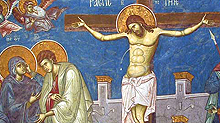Fasting and Great Lent
 Great Lent is the 40-day season of spiritual preparation that comes before the most important Feast of the Christian year, Holy Pascha (which means “Passover” and is commonly called “Easter”). It is the central part of a larger time of preparation called the Triodion season. The Triodion begins ten weeks before Easter and is divided into three main parts: three Pre-Lenten weeks of preparing our hearts, the six weeks of Lent, and Holy Week. The main theme of the Triodion is repentance — mankind's return to God, our loving Father.
Great Lent is the 40-day season of spiritual preparation that comes before the most important Feast of the Christian year, Holy Pascha (which means “Passover” and is commonly called “Easter”). It is the central part of a larger time of preparation called the Triodion season. The Triodion begins ten weeks before Easter and is divided into three main parts: three Pre-Lenten weeks of preparing our hearts, the six weeks of Lent, and Holy Week. The main theme of the Triodion is repentance — mankind's return to God, our loving Father.
This annual season of repentance is a spiritual journey with our Savior. Our goal is to meet the risen Lord Jesus, Who reunites us with God the Father. The Father is always waiting to greet us with outstretched hands. We must ask ourselves the question, “Are we willing to turn to Him?” During Great Lent, the Church teaches us how to receive Him by using the two great means of repentance - prayer and fasting.
The word “fast” means not eating all or certain foods. As Orthodox Faithful, we can fast completely at certain times of great importance, and especially each time before receiving Holy Communion. Usually, fasting means limiting the number of meals and/or the type of food eaten.
The purpose of fasting is to remind us of the Scriptural teaching, “Man does not live by bread alone.” The needs of the body are nothing compared to the needs of the soul. Above all else, we need God, Who provides everything for both the body and the soul. Fasting teaches us to depend on God more fully.
The first sin of our parents, Adam and Eve, was eating from the forbidden tree (Genesis 3:1-19). We fast from food, or a food item, as a reminder that we are to fast from sinning and doing evil.
There are several benefits of fasting. Fasting helps us pray more easily. Our spirit is lighter when we are not weighed down by too much food or food that is too rich. Through fasting, we also learn to feel compassion for the poor and hungry and to save our own resources so that we can help those in need.
Fasting is more than not eating food. Saint John Chrysostom teaches that it is more important to fast from sin. For example, besides controlling what goes into our mouths, we must control what comes out of our mouths as well. Are our words pleasing to God, or do we curse God or our brother? The other members of the body also need to fast: our eyes from seeing evil, our ears from hearing evil, our limbs from participating in anything that is not of God. Most important of all, we need to control our thoughts, for thoughts are the source of our actions, whether good or evil.
Fasting is not an end in itself. Our goal is an inner change of heart. The Lenten Fast is called “ascetic.” This refers to an action of self-denial and spiritual training which are central to fasting. Fasting is a spiritual exercise. It is not imposed or forced upon us. In the same way that true repentance cannot be forced upon anyone, each of us makes the choice to turn away from our sinful.

